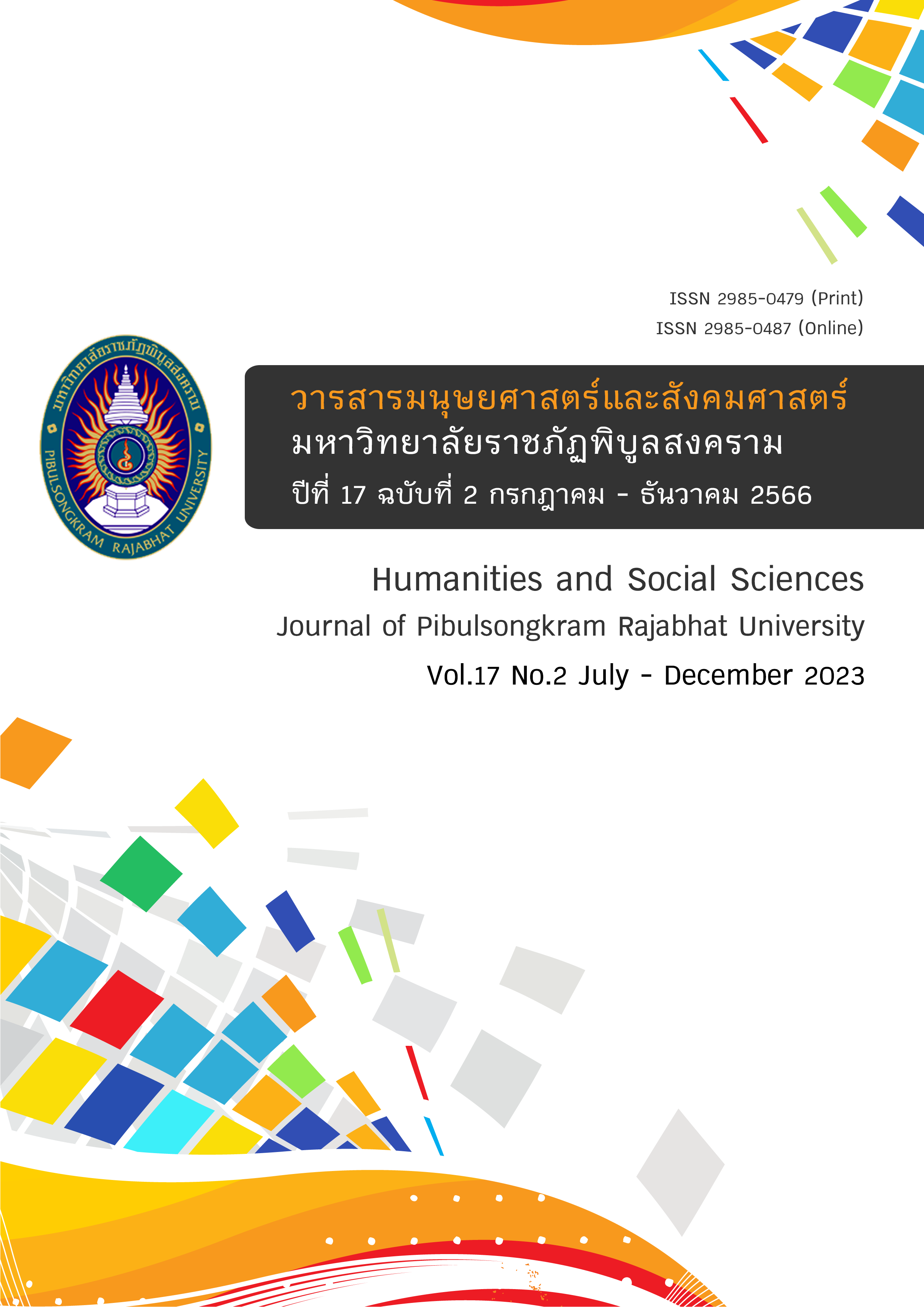Arguments to Critique Transformative Learning Theory
DOI:
https://doi.org/10.14456/psruhss.2023.35Keywords:
Transformative learning, Rationality, Validity claim, Argument, CritiqueAbstract
The aim of this paper is to develop arguments to critique Jack Mezirow’s transformative learning theory, which relate with the issues of Jürgen Habermas’s rationality and validity claim. Research methodology in this study is documentary research and using document analysis. This research methodology will be the documentary research and employ the qualitative criterion of managing data sources to collect and interpret the qualitative data. The primary sources are Habermas’ The theory of communicative action: Volume One and Volume Two (Habermas, 1984, 1987) and Mezirow’ major works on transformative learning theory (Mezirow, 1985, 1990, 1991a, 1991b, 1996), including seven other secondary sources (Calleja, 2014; Dirkx, 1998; Fleming, 2005, 2018, 2020; Taylor, 1997; Taylor & Cranton, 2012). For the qualitative data analysis, it found that four arguments emerged: (1) Mezirow emphasized social dimension through discourse for transformation at the levels of individual and group; (2) cognitive and logical processes as a part of Habermas’s rationality; (3) Mezirow recognized and accepted emotional dimension in discourse; and (4) dividing emotional dimension in only two types (positive and negative emotions) can possibly become a constraint of emotional dimension in transformative learning theory. These were due to connection between Habermas’ aspects of rationality, types of action, and forms of validity claim that are the theoretical roots of significant elements in Mezirow’s transformative learning theory, especially in dimensions of learning, critical reflection, and discourse.
References
Calleja, C. (2014). Jack Mezirow’s conceptualization of adult transformative learning: A review. Journal of Adult and Continuing Education, 20(1), 117-136.
Cranton, P. (1994). Understanding and promoting transformative learning: A guide for educators of adults. San Francisco: Jossey-Bass.
Cranton, P. (1996). Professional development as transformative learning: New perspectives for teachers of adults. San Francisco: Jossey-Bass.
Cranton, P. (2006). Understanding and promoting transformative learning: A guide for educators of adults (2nd ed.). San Francisco: Jossey-Bass.
Dirkx, J. M. (1998). Transformative learning theory in the practice of adult education: An overview. PAACE Journal of Lifelong Learning, 7, 1–14.
Fleming, T. (2005). Habermas on civil society, lifeworld and system: Unearthing the social in transformative theory. Teachers College Record. [Online]. Retrieved September 1, 2021 from https://www.tcrecord.org ID Number: 10877.
Fleming, T. (2018). Critical theory and transformative learning: Rethinking the radical intent of Mezirow’s theory. International Journal of Adult Vocational Education and Technology, 9(3), 1-13.
Fleming, T. (2020). Critical theory and transformative learning: Making connections with Habermas, Honneth and Negt. [Online]. Retrieved September 1, 2021 from https://www.researchgate.net
Habermas, J. (1984). The theory of communicative action: Volume one: Reason and the rationalization of society. Boston: Beacon Press.
Habermas, J. (1987). The theory of communicative action: Volume two: Lifeworld and system: A critique of functionalist reason. Boston: Beacon Press.
Illeris, K. (2004). Transformative learning in the perspective of a comprehensive learning theory. Journal of Transformative Education, 2(2), 79-89.
Kokkos, A. (2019). Expanding transformative theory: Affinities between Jack Mezirow and other emancipatory educationalists. London: Routledge.
Lawrence, R. L. (2012). Transformative learning through artistic expression: Getting out of our heads. In Taylor, E., Cranton, P. (Eds.), The handbook of transformative learning: Theory, research, and practice (pp. 471–485). San Francisco, CA: Jossey-Bass.
Mezirow, J. (1985). Concept and action in adult education. Adult Education Quarterly, 35(3), 142-151.
Mezirow, J. (1990). How critical reflection triggers transformative learning. In J. Mezirow (Ed.), Fostering critical reflection in adulthood, (pp. 1-20). San Francisco, CA: Jossey-Bass.
Mezirow, J. (1991a). Transformative dimensions of adult learning. San Francisco, CA: Jossey-Bass.
Mezirow, J. (1991b). Transformative theory and cultural context: A reply to Clark and Wilson. Adult Education Quarterly, 41(3), 188-192.
Mezirow, J. (1996). Beyond Freire and Habermas: Confusion. A response to Bruce Pietrykowski. Adult Education Quarterly, 46(4), 237-239.
Mezirow, J. (2000). Learning as transformation: Critical perspectives on a theory in progress. San Francisco: Jossey Bass.
Mogalakwe, M. (2006). The use of documentary research methods in social research. African Sociological Review, 10(1), 221-230.
Reddy, W. M. (2001). The logic of action: Indeterminacy, emotion, and historical narrative. History and theory, 40(4), 10-33.
Scott, J. (1990). A matter of record, documentary sources in social research. Cambridge: Polity Press.
Taylor, E. W. (1997). Building on the theoretical debate: A critical review of the empirical studies of Mezirow's transformative learning theory. Adult Education Quarterly, 48(1), 34-60.
Taylor, E. W. (1998). The theory and practice of transformative learning: A critical review. Retrieved July 20, 2014, from http://files.eric.ed.gov/fulltext/ED423422.pdf
Taylor, E. W. (2007). An update of transformative learning theory: A critical review of the empirical research (1999-2005). International Journal of Lifelong Education, 26(2), 173-191.
Taylor, E. W., & Cranton, P. (2012). The handbook of transformative learning: Theory, research, and practice. NY: John Wiley & Sons.
Downloads
Published
How to Cite
Issue
Section
License
Copyright (c) 2023 Humanities and Social Sciences Journal of Pibulsongkram Rajabhat University

This work is licensed under a Creative Commons Attribution-NonCommercial-NoDerivatives 4.0 International License.
Any articles or comments appearing in the Journal of Humanities and Social Sciences, Rajabhat Phibulsongkram University, are the intellectual property of the authors, and do not necessarily reflect the views of the editorial board. Published articles are copyrighted by the Journal of Humanities and Social Sciences, Rajabhat Phibulsongkram University.









